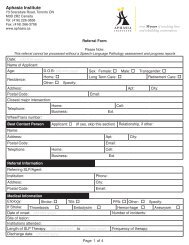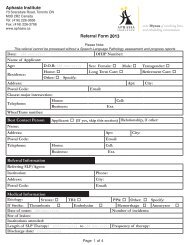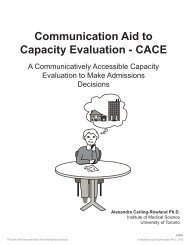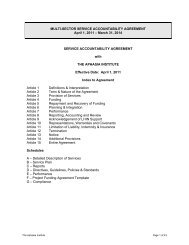SLP Survey Report_Final - Aphasia Institute
SLP Survey Report_Final - Aphasia Institute
SLP Survey Report_Final - Aphasia Institute
Create successful ePaper yourself
Turn your PDF publications into a flip-book with our unique Google optimized e-Paper software.
Section F: Comments<br />
Services<br />
• Adults with communication and swallowing disorders are underserved throughout the<br />
province of BC in all areas - acute, community, long-term care.<br />
• In the GTA (Greater Toronto Area), referrals for community access care services for stroke<br />
are most often denied or have significant wait times; community group support in other<br />
languages are lacking and government funding for aphasia is not as high a priority<br />
compared with swallowing interventions.<br />
• Adult S-LP services in the province are underfunded and as a result it is difficult to provide<br />
optimal treatment to these populations. Our staff have been innovative and do the best that<br />
they can within the constraints of current staffing.<br />
• it all sounds great and this is all so important, but the issues are complex. There are too<br />
many patients to see and too few <strong>SLP</strong>S. Moreover, I think that some of the treatment we<br />
give is not all that effective, in part because we just don’t have time to do it properly.<br />
When I look at Gabby Gifford’s and her amazing recovery following a gunshot wound, I<br />
wonder how many facilities in Canada would have just discharged her instead of taking the<br />
time to do the painstaking work needed to help her reach her maximum potential.<br />
Americans may do treatment too much at times and billing is a huge issue south of the<br />
border, but do we give people enough chances? And do we put enough thought into said<br />
chances? I think the answers are sometimes yes and sometimes no.<br />
• Having a large geographical region to cover and a high demand for service makes meeting<br />
the best practices very difficult despite great intentions and efforts to do so on the part of<br />
employer and staff.<br />
• More resources are badly needed as the number of patients with aphasia seems to be<br />
increasing. Incentives for physicians and nurses to seek training in communication<br />
strategies with people with aphasia would be most helpful. Education on aphasia should be<br />
a mandatory part of medical and nursing study program.<br />
Time Constraints<br />
• I find there isn't enough time to do therapy with my aphasia patients and that the dysphagia<br />
patients take up all of my time. I can only evaluate 2 per morning and even then the reports<br />
aren't quite finished. On top of that there are tracheotomy patients as well as the aphasia<br />
and dysarthria patients, to name a few. Unfortunately, therapy has to go on the back burner<br />
so that I can complete all of my evaluations.<br />
Evidence, best practice guidelines<br />
• We seem to be falling farther and farther behind an evidence-based practice ideal....<br />
• There is a lot of evidence that can guide best practice in stroke care. I am surprised with the<br />
lack of interest or regard for this evidence.<br />
• Adult AAC evidence says to offer it a.s.a.p., but waitlists are more than one year! Also<br />
<strong>SLP</strong>s and other professionals think of AAC as a last resort- should be first resort- but<br />
clinics have been halved.<br />
• I have found that rather than programs and services that are solidly built around the current<br />
evidence, programs and services are endorsed and promoted that fit the hospital/Local<br />
Health Integration Networks funding models. It would be beneficial for CA<strong>SLP</strong>A to<br />
<br />
53











